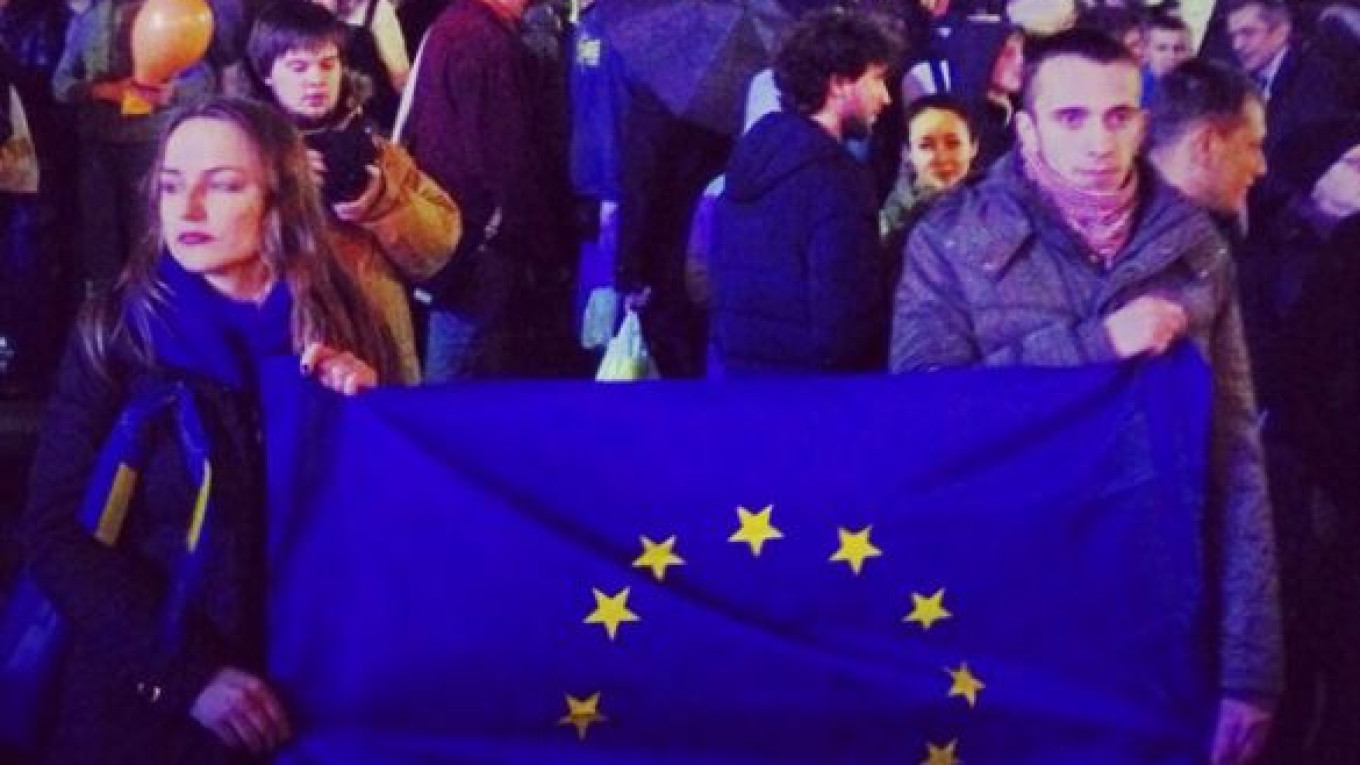As protesters kept vigil in central Kiev to demand integration with the European Union, opposition leaders in parliament called for an emergency session to raise a vote of no confidence in the Cabinet and adopt bills that would pave the way for EU association.
Leaders of three opposition factions in Ukraine's parliament — Vitaly Klitschko, Oleh Tyahnybok and Arseniy Yatsenyuk — demanded an emergency session of the Verkhovna Rada on Wednesday to "clear the way for reaching an agreement between Ukraine and the European Union" later this week, Interfax reported Monday.
The opposition leaders want the session to hold a no-confidence vote in the government for backing out of the European integration deal, and to consider bills on judicial reform and the release of jailed opposition leader Yulia Tymoshenko, which the EU had set as benchmarks for Ukraine to meet before signing the integration deal.
Ukrainian President Viktor Yanukovych's abrupt move to give up the EU deal in favor of greater cooperation with Russia prompted tens of thousands of people to take to the streets in Kiev, in the biggest protest since Ukraine's 2004 Orange Revolution.
By Monday morning, several hundred protesters continued to hold the fort in Kiev's European Square, taking shelter from a drizzling rain in canvas tents put up on the pavement, listening to music, and chanting "police is with the people" at security troops surrounding the plaza.
Ukrainian Prime Minister Nikolai Azarov said that plans for European integration had to be put on hold after Ukraine failed to reach a deal with either Russia for preserving trade, or with the EU for "compensating" Ukraine for economic losses it would have incurred from export restrictions that Moscow had threatened, Itar-Tass reported.
President Vladimir Putin had put strong pressure on Ukraine to back out of the EU deal, which was to be signed later this week. He insisted that Moscow would be "forced" to curtail trade with Ukraine to protect the Russian economy, and urged Ukraine to join the Moscow-led Customs Union of former Soviet republics instead.
Azarov said that Ukraine had also hoped for the EU's help in securing a loan from the International Monetary Fund but the fund offered conditions that "Kiev could not accept," putting the final nail in Ukraine's European integration plans.
"We had to either take a pause, solve the problems that came up and save jobs, or sign the deal on an association with the EU and face the measures that the Customs Union would have taken," Azarov said.
While the EU faced a considerable burden in opening the doors to economically struggling Ukraine, Azarov also lambasted European leaders for declining to make concessions to his country.
"Why is it that when Russia makes some demands to us, we call it blackmail and pressure, but when the EU makes demands, which are also unprofitable and inconvenient for us, we consider that normal?" Azarov said.
A Message from The Moscow Times:
Dear readers,
We are facing unprecedented challenges. Russia's Prosecutor General's Office has designated The Moscow Times as an "undesirable" organization, criminalizing our work and putting our staff at risk of prosecution. This follows our earlier unjust labeling as a "foreign agent."
These actions are direct attempts to silence independent journalism in Russia. The authorities claim our work "discredits the decisions of the Russian leadership." We see things differently: we strive to provide accurate, unbiased reporting on Russia.
We, the journalists of The Moscow Times, refuse to be silenced. But to continue our work, we need your help.
Your support, no matter how small, makes a world of difference. If you can, please support us monthly starting from just $2. It's quick to set up, and every contribution makes a significant impact.
By supporting The Moscow Times, you're defending open, independent journalism in the face of repression. Thank you for standing with us.
Remind me later.


